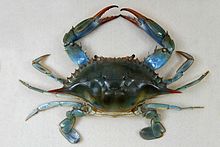
Back سرطان أزرق Arabic سرطان ازرق ARZ Син рак Bulgarian Cranc blau Catalan Callinectes sapidus CEB Blaukrabbe German Callinectes sapidus Spanish Tavaline sinikrabi Estonian Callinectes sapidus Basque خرچنگ آبی Persian
| Callinectes sapidus | |
|---|---|

| |
| Female from the collection of The Children's Museum of Indianapolis | |
| Scientific classification | |
| Domain: | Eukaryota |
| Kingdom: | Animalia |
| Phylum: | Arthropoda |
| Class: | Malacostraca |
| Order: | Decapoda |
| Suborder: | Pleocyemata |
| Infraorder: | Brachyura |
| Family: | Portunidae |
| Genus: | Callinectes |
| Species: | C. sapidus
|
| Binomial name | |
| Callinectes sapidus Rathbun, 1896
| |
| Synonyms [1] | |
| |

Callinectes sapidus (from the Ancient Greek κάλλος,"beautiful" + nectes, "swimmer", and Latin sapidus, "savory"), the blue crab, Atlantic blue crab, or, regionally, the Maryland blue crab, is a species of crab native to the waters of the western Atlantic Ocean and the Gulf of Mexico, and introduced internationally.
C. sapidus is of considerable culinary and economic importance in the United States, particularly in Louisiana, the Carolinas, the Chesapeake Bay, Delaware, and New Jersey. It is the Maryland state crustacean and the state's largest commercial fishery.[2] Due to overfishing and environmental pressures some of the fisheries have seen declining yields, especially in the Chesapeake Bay fishery.
Unlike other fisheries affected by climate change, blue crab is expected to do well; warming causes better breeding conditions, more survivable winters, and a greater range of habitable areas on the Atlantic coast.[3][4] Whether this will have negative effects on the surrounding ecosystems from an increased crab population is still unclear.[3]
- ^ "Species Fact Sheet: Callinectes sapidus (Rathbun, 1896)". Food and Agriculture Organization. Retrieved November 28, 2010.
- ^ "Maryland State Crustacean". Maryland State Archives. December 27, 2005.
- ^ a b "Blue Crabs Will Thrive Because Of Climate Change. Is That Really A Good Thing?". WAMU. Retrieved December 11, 2020.
- ^ Fears, Darryl. "Climate change will spark a baby boom of blue crabs. Then predators will relocate from the south and eat them". Washington Post. ISSN 0190-8286. Retrieved December 11, 2020.
© MMXXIII Rich X Search. We shall prevail. All rights reserved. Rich X Search